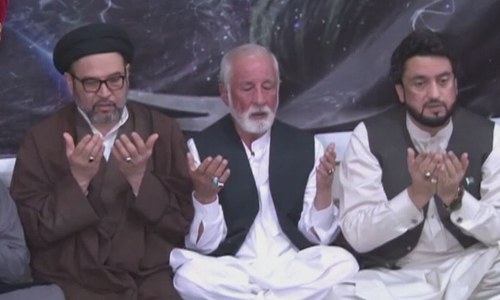THE mountains on the western end of Quetta city are mammoth. The busy western bypass separates the Hazara town’s cemetery from the mountains.
On a normal day, Hazaras can hardly be seen at the cemetery, let alone being found on the western bypass road. They do not come out because they are afraid of being shot.
A case in point is the killing of Hazaras in Hazarganji, a suburb of Quetta, last week. They had gone to buy vegetables under FC escort. After the carnage, the Hazara community set up a camp on western bypass road to mourn their brethren.
Read more: Hazara community ends sit-in after receiving assurances from state minister, Balochistan CM
The Hazaras, especially women and children, are a ghettoised lot these days. They step outside their neighbourhood only at the time of sit-ins.
When I visited the camp on Monday, children were playing on the other side of the road — a simple pleasure that, ironically, they cannot indulge in when things are normal.
Know more: Situationer | Hazaras: Fault in their faces
Meanwhile, they hike up the mountains.
In a nutshell, Hazaras breathe freely only when they take to the streets to mourn the death of their loved ones.
For Mehdi Hazara, 12, this is the second time that he has come to the bypass to play with his friends. In his broken Urdu, he tells Dawn that when the last time he was on this road, his community had staged a sit-in to protest another bout of savagery at Qandahari Bazaar, in the heart of the city.
With a grin, he says he comes here for his community because it has always been under attack.
The number of agitators runs into the hundreds. People belonging to other communities, too, are there in sizeable numbers to show solidarity with Hazaras. Although there is fear and resentment among Hazaras, they do not show it.
Instead, they want to know why they are being targeted time and again and there is no tinge of hate in their conversation.
One of them is Ali Madad Hazara, 69. “Despite these atrocities, we do not teach our children hatred against anyone. Instead, we teach them about peace and harmony.”
Ali Madad lives with his wife on Mariabad Road, on the eastern side of Quetta city. His children left the country after the scourge of sectarian killings started taking root in this city.
Madad’s children do not speak to him because he did not leave the country along with them. They send him money to make ends meet. “Although they are not on talking terms with me, they send money because they do not want their parents to die in poverty.”
He gets irritated after I ask him about Hazaras’ demands. “Have we ever made any demand?” he asks rhetorically.
“We want to live in peace because we have already suffered a lot. We can take it (killings) no more. We have been given assurance after assurance,” Madad Hazara reminisces about promises made in the past. “I wonder what else they are going to promise now.”
Ali Raza Hazara has been coming to the camp since it was set up a few days ago. Other than the dead, he tells Dawn, there are many maimed and orphaned Hazaras. “Where is it leading to?”
Hazara women and girls are sitting inside the camp. Jalila Haider, a well-known lawyer and activist, is also present. After taking a phone call, she informs people around her that Minister of State for Interior Sheharyar Afridi wants to visit the camp. “But his men want guarantee on the condition that they would end the sit-in. What guarantee can I give him?”
The Hazara Democratic Party (HDP), which won two provincial assembly seats in Hazara-dominated areas of Quetta in the general election last year and is now a part of Balochistan’s coalition government, has accused the protesters of doing politics in the wake of the Hazarganji incident.
A newspaper, Azadi, quoted a spokesman for the party as saying that the sit-in’s leaders are unknown and their “agendas and demands are sketchy”. The statement came after the agitators said they would call off the sit-in once HDP leader Khaliq Hazara guaranteed on behalf of the provincial government that their “demands” would be accepted. Mr Khaliq refused to do so.
Tahir Khan Hazara is said to be an outspoken critic of the government. He uses a term, “war politics”, for Hazara killings. Holding a mike in his hand, he calls for upholding supremacy of the constitution.
And then he goes on to lament that “our demands have always been turned down” for unknown reasons. He dismisses the notion that the Hazara killings are all about sectarianism. Instead, he surmises, “imperialist forces are behind the slaughter”.
Published in Dawn, April 16th, 2019















































